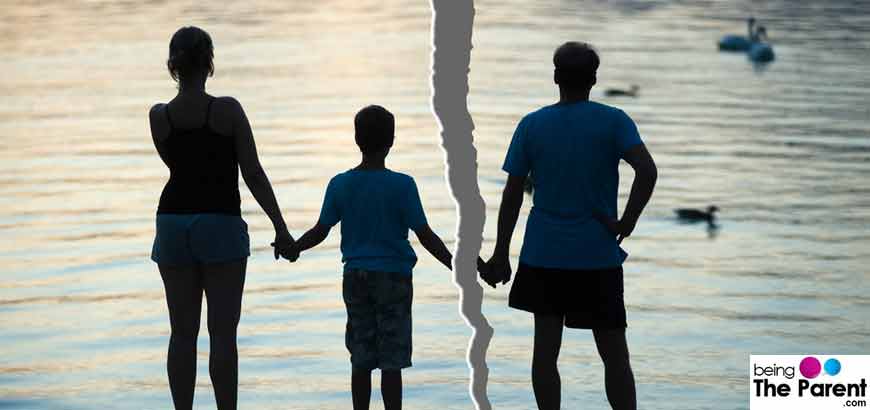
Preparing Your Child For A Divorce
4 min readWritten by Editorial Team

 Every year, thousands of kids experience the stress of divorce, how they react about it depends on their personality, age and circumstances and separation procedure. Parents need to be cautious and very supportive when a child is involved in the process of a separation, and though many children these days are aware of the concept of a divorce, or parents living apart, it is always a complex transition for any child.
Every year, thousands of kids experience the stress of divorce, how they react about it depends on their personality, age and circumstances and separation procedure. Parents need to be cautious and very supportive when a child is involved in the process of a separation, and though many children these days are aware of the concept of a divorce, or parents living apart, it is always a complex transition for any child.
Breaking The News:
Keep it simple: Speak in a way your child will understand. Tell the truth as he is entitled to know about it. Pick up simple words which he can understand and be honest. If your child has seen a lot of arguments over few days he might be in a better position to understand what is best for the family. Listen to him if he has something to say, and answer all his questions.
Break it together: Maybe you both disagree on every little thing, but you both need to agree and come together to tell your child about a divorce or a separation that is on its way. This avoids confusion and child will be able to know both sides of the story. Always let him know it is a mutual decision.
Avoid blaming: Hold your anger and curb those emotions – do not play the blame game and avoid arguing in front of your child. Any details about financial problems or an extra martial affair should not be disclosed. Always remember whatever you say will reflect on him. Badmouthing about each other will only make your child loose faith in relationships.
Avoid legal discussions: Do not show your divorce papers to your kid, especially if he can read. Do not discuss legal issues in front of your child, on the dining table or kitchen, not even over the phone if the child is around specially custody evaluation.

Never Argue In Front Of Your Child
Tell your child it’s not his fault: Children are sensitive and innocent, they might blame themselves for the separation by recalling the times when the parents’ argued over poor grades, or bad behaviour or even the untidy room. Let your child know that it is an adult decision to live apart and has nothing to do with him. Be patient and understand his insecurities, and solve them.
Be Prepared For The Questions:
Your child will be asking you a lot of questions, so you need to be prepared for them. Snubbing your child for his doubts is not at all fair by any means, he needs to know and you must calmly answer them, preferably together. Some of the most common questions are:
What is a divorce? – No, do not jump to definitions or details, just say that divorce will just make mommy and daddy live apart, and the child will be loved and cared for, no matter what.
Why are you getting divorced? – This could be a toughie, but you need to eliminate the “I’s” and the “lack of love”, and focus on “we”.
I want my Dad/Mom back? – Unless your partner was abusive and there was constant fighting in the house, it is very likely that your child is going to miss the other parent. Don’t be sad or hurt at hour child’s longing, both of you need to accept that he is out of your personal space as a couple.
Some other questions like “Who will make my bed?, Where will I sleep, How will I go to school etc will also crop up. You need to address all these questions calmly and try to be patient with him.
Give Out Love and Reassurance
Your child can heal and come out of this situation if given enough love and support he needs. Your words and actions are the important tools to reassure him. Let him know mommy and daddy will be there for him all times; it might not be easy, but you need to make it work for your child. Hugging, kissing and a pat on the shoulder is a powerful way to show love and affection.
Adults who go through separation and legal formalities do need support from family and friends, but never speak about confidential matters to your children, especially when they are young.
How Will It Impact The Child?
Each divorce does have a significant affect on children -the most common would be sadness, shock, anger and frustration. But the kids can cope with it and become flexible, if they are assured that their equations remain unchanged. School goers do understand what divorce is, they may have friends whose parents’ marriage has ended and are aware about the concept of parents who do not live together. However, the below pointers will make it easy for you-
- Let the routines be unchanged.
- Keep the talking happening, every now and then.
- Be available for your child at all times.
- Look for any signs of trouble, watch-out for behavioral anomalies.
- Always remain positive and refrain from speaking ill for your ex.
- Seek the help of other family members and a family therapist.
Do not be surprised if your child starts getting difficult at times, behaves mischievously, shows frustration and appears insecure. He might be quite anxious too, and will ask a number of questions so be prepared to answer them as well. Some kids might show sadness and anger openly while some might be very good at hiding the same. But remember assuring them no matter what happens that they will be given same the love and care is most important of all.

Editorial Team,
With a rich experience in pregnancy and parenting, our team of experts create insightful, well-curated, and easy-to-read content for our to-be-parents and parents at all stages of parenting.Read more.
Responses (0)
Want curated content sharply tailored for your exact stage of parenting?
Related articles

The Lion and The Mouse Story With Moral For Kids

Growing Your Family’s Wealth: Investing Tips for Parents

8 Interesting Ways Dads Can Help Their Breastfeeding Partner

Threptin Biscuits For Babies – Are They Safe?

The Ant and The Grasshopper Story With Moral in English

How to Choose Compression Socks During Pregnancy?
Sponsored content
Discover great local businesses around you for your kids.
Get regular updates, great recommendations and other right stuff at the right time.





